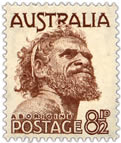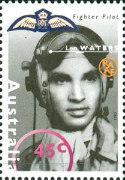History
Timeline results for 1400 to 2020
Found 44 results for your search. Showing page 1 of 3.
Year from 1400, year to 2020, month is August
1824
-
Martial law is proclaimed in the Bathurst area when seven Europeans are killed by Aboriginal people led by Aboriginal man Windradyne, and conflict with them is seen as a serious threat. Soldiers, mounted police, settlers and stockmen frequently attack Aboriginal people. As many as 100 are killed in a massacre at Bathurst. Martial law stops in December. This conflict became known as the “Bathurst War”.
1841
-
30 Aboriginal people massacred at Rufus River in New South Wales, close to the boundaries with Victoria and South Australia.
1950
-

Gwoya Jungarai The portrait of Gwoya Jungarai (c.1895-1965, also spelled Tjungurrayi or Djungarai) of the Warlpiri people, Central Australia, appears on the 8 1/2 pence (8 1/2d) and two shillings and sixpence (2s.6d, issued 1952) definitive stamps. It is the first time a living Australian — settler or Aboriginal — is featured on a stamp.
The stamps become widely known as “One Pound Jimmy” because when asked the price of his artefacts for sale Gwoya always replied “One Pound”. Tjungurrayi was a stockman, traditional lawman, and survivor of the brutal 1928 Coniston massacre. His portrait is later engraved on the two dollar coin.
1972
-
NSW Director-General of Education approved the removal of the section of the teachers’ handbook that allowed school principals to refuse enrolment to Aboriginal children because of home conditions or substantial opposition from the community.
1977
-
NASA launches spacecraft Voyager 2 (on 20 August) and Voyager 1 (on 5 September), each carrying a golden record with examples of the aural heritage of Earth as music, sounds and verbal greetings. The music section includes an 86-second recording of Senior Yolgnu men Mudpo, Djawa (Tom) and Waliparu singing 'Morning Star' (about the Barnumbirr morning star ceremonies) and 'Mokoi' (about the malicious spirits, morkoi, who try to lure souls away from Country). [1][2]
1979
-
Protesters at Capital Hill, Canberra, demand the the federal government to enter treaty negotiations with Aboriginal people. The Prime Minister advises that he would discuss the matter of a treaty with the National Aboriginal Conference, the elected body representing Aboriginal people. The NAC, aware of the government's opposition to the word 'treaty', chooses to use the Yolgnu word 'Makarrata', which was first published as meaning 'the resumption of normal relations at the end of a conflict', but later known to mean 'pay-back killings between families or tribes'.
-
Aboriginal activist Kevin Gilbert writes to the Prime Minister identifying the key issues of Aboriginal Nations' sovereignty, the need for a treaty, and a Bill of Rights. [3]
In his reply, the prime minister concludes that he and his government are prepared to consider a treaty with the elected body the National Aboriginal Conference.
I shall be pleased to discuss the concept of a treaty with the National Aboriginal Conference.
— Prime Minister Malcolm Fraser [3]
1988
-
Australia Post issues four stamps celebrating the Art of the Desert. All paintings selected for this issue depict an event in the Dreaming: Bush Potato Country (Turkey Tolsen Tjupurrula & David Corby Tjapaltjarri, 37c), Courtship Rejected (Limpi Puntungka Tjapangati, 55c), Medicine Story (unknown artist, 90c) and Ancestor Dreaming (Tim Leura Tjapaltjarri, $1).

The issue features four stamps from the Flinders University Art Museum that depict an event in the Dreaming.
1994
-
The UN’s General Assembly marks this day as the International Day of the World’s Indigenous People.
1995
-

Len Waters was a fighter pilot for the RAAF. Streets in ACT and Sydney bear his name. In its second Australia Remembers issue, Australia Post features Len Waters who became the first Aboriginal military pilot accepted into the Royal Australian Air Force and the only Aboriginal fighter pilot to serve during World War II.
1997
-
The stamps in this issue are images from four animations of The Dreaming series, a video series of 13 animated stories for children, released by the Australian Film Commission in 1995 and 1997.
The images show Dumbi the owl (based on a story by David Mowaljarlai of the Hibiscus people), The Two Willy-Willies (a story told by Josie Boyle from the desert people of the Wongi nation), How Brolga Became a Bird (a story told by Pauline McLeod from the Mutti Mutti people of Lake Mungo, NSW) and Tuggan Tuggan (Silky Oak) (a story told by Oodgeroo Noonuccal from Stradbroke Island).

Left to right: Dumbi the Owl; The Two Willy-Willies; How Brolga Became an Owl; Tuggan Tuggan.
1999
-
Federal Parliament issues a statement of deep and sincere regret over the forced removal of Aboriginal children from their families.
2001
-
Jack Ah Kit, a Jawoyn man from Alice Springs, becomes the first Aboriginal government minister of the Northern Territory when the Australian Labor Party wins office. His portfolios include local government, housing and sport. He resigned in 2005 for health reasons.
2007
-
Bruce Trevorrow is the first person to receive Stolen Generations compensation by a court. A court awards him $525,000 for ‘pain, suffering and false imprisonment’ [4].
-
In a landmark court case a member of the Stolen Generations has been awarded $525,000 in compensation by a South Australian court for a liftetime of sorrow and pain [5]. Bruce Trevorrow was taken from his father aged 13 months. He was given to a white family where he grew up until he was ten, unaware of his Aboriginality. He then saw his mother again, but at this stage was a rebellious boy not belonging to either culture.
Mr. Trevorrow's life followed the path of many taken children: times in and out of jail and other institutions, poor health, alcoholism, smoking, depression. His siblings who remained with the family were able to overcome life's difficulties.
The justice's judgment established for the first time that removing a child from his family in these circumstances constituted wrongful imprisonment and was a breach of the state's duty of care. He awarded Mr Trevorrow $450,000 for injuries and losses suffered, and a further $75,000 in damages for his unlawful removal and false imprisonment.
-
ANTAR launches 'Hard Labour, Stolen Wages', a report on stolen wages, written by historian Dr Rosalind Kidd. The report gives a state by state account of the history of stolen wages.
-
The High Court rejects legislation passed by the Howard government which denied all prisoners the right to vote. This law was challenged by Vickie Roach, an Aboriginal prisoner in Melbourne. But the Court upheld the validity of the law providing that prisoners serving a sentence of three years or longer are not
entitled to vote.
2008
-
The Canberra suburb of Bonner names public places and roads after prominent Aboriginal leaders and their supporters. The suburb itself was named after Neville Bonner, the first Aboriginal person to sit in federal parliament as a Senator for Queensland from 1971 to 1983.
-
Medical specialists and officers make a submission to the NT Emergency Review Board detailing chronic under-funding of existing health services, a lack of consultation with health professionals and Aboriginal communities, and the inadequacy of performing child health checks, which often duplicated information that was already known, at great cost and with little benefit.
2009
-
The Australian government refuses compensation despite the UN being 'concerned about a lack of adequate access to justice' [6] for Indigenous people and recommending the government compensating victims of the Stolen Generations. The UN responded to a formal complaint submitted by the Aboriginal Legal Rights Movement in March.
References
View article sources (6)
[1]
'Golden record', AIATSIS newsletter 30/11/2021
[2]
'Voyager Golden Record', Wikipedia, retrieved 5/12/2021, available at en.wikipedia.org/wiki/Voyager_Golden_Record
[3]
[3a]
'Makarrata v Treaties', Sovereign Union 18/8/2017
[4]
National Indigenous Times 135 p.4
[5]
National Indigenous Times, 9/8/2007
[6]
'Federal Govt ignores UN Stolen Generations request', www.abc.net.au, 21/8/2009



